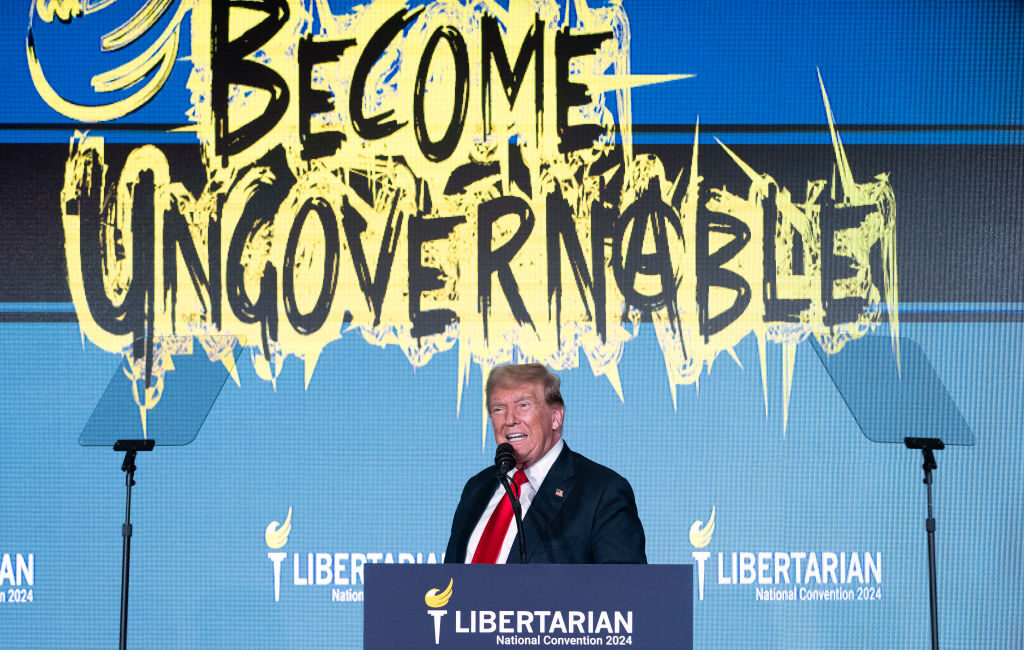Reflecting broader changes in Republican politics, Donald Trump faced jeers at the National Libertarian Convention in Washington, DC on Saturday, just a few days after he won cheers at a spirited rally with working-class voters in the South Bronx.
The presumptive Republican nominee addressed third-party supporters in the nation’s capital partly to box out independent candidate Robert F. Kennedy Jr, who has hoped to bring registered Libertarians into his coalition of outsiders. Trump himself has made appealing to the politically disaffected a core theme of his campaigns, so his overture yesterday included a pledge to commute the life sentence of Ross Ulbricht, the founder of the online marketplace Silk Road, and grant a Libertarian a cabinet slot.
It’s not surprising that there should be some friction between Trump and the Libertarian delegates. A quintessentially transactional politician, Trump seems singularly uninterested in ideology — libertarian or otherwise. What’s more, his populist policies are at odds with the doctrines of many professional libertarians. For instance, while libertarians are famously sceptical about federal entitlements, Trump has pledged to preserve Social Security and Medicare. Many libertarians are more sympathetic to open borders and free trade, but the former president has instead based his political brand on opposing illegal immigration and imposing tariffs.
Registered Libertarians (especially those who sojourn to the party’s national convention) are true believers. Unlike many online influencers, they have not forgotten the excesses of the Covid-19 era and still hold Trump’s pandemic policies against him. Some attendees even wore satirical t-shirts proclaiming, “TRUMP/FAUCI 2024: Give Us Another Shot”. For many such Libertarians, “leave us alone” is both an ideology of non-intervention and an ethos of rowdiness. Boos were perhaps inevitable. After all, a Libertarian presidential debate in 2016 dissolved into audience derision when former New Mexico governor Gary Johnson said he believed in the need for driver’s licences.
This ideological purity is the opposite of Trump’s “let’s make a deal” approach to governing. At one point, Trump goaded the restive crowd, saying that — if they refused to back him — Libertarians could just go back to “what you’ve been doing for the last long decades and get your 3% and meet again and get another 3%”. For Trump, the point of electoral politics is to win — not to maintain any purity of principle.
For a long time, registered Libertarians have been on the periphery of Republican politics. Former elected Republicans won Libertarian presidential nominations multiple times over the past 20 years, and the Libertarian and Republican talent networks often overlapped. Libertarians had sometimes been foes of social conservatives and were critical of the national-security policies of the GOP, but they also felt sympathetic to many Republican policies on deregulation and decentralisation. The rise of populism has arguably strained that relationship.
However, even if Trump may be at odds with professional Libertarians, many rank-and-file Republican voters have a combination of populist and folk-libertarian sentiments. While they might not be dogmatic believers in government non-intervention, they also remain sceptical about the exertion of centralised government power. Polling of early primary voters in the summer of 2023 confirmed this — they overwhelmingly backed tax cuts and deregulation as ways of addressing economic challenges.
Further, many grassroots voters are deeply worried about being steamrolled by the progressive cultural vanguard. These Americans might not have read Ludwig von Mises or Friedrich Hayek, but they have seen the politics of identity that has captured the commanding heights — and they don’t like it. As part of his project of coalition management, Joe Biden has given this vanguard a blank cheque on many issues, so these folk-libertarian voters might see Trump as the most plausible bulwark against the triumph of “woke” policy-making. If Trump is not a dogmatic ideologue, neither are most voters.











Join the discussion
Join like minded readers that support our journalism by becoming a paid subscriber
To join the discussion in the comments, become a paid subscriber.
Join like minded readers that support our journalism, read unlimited articles and enjoy other subscriber-only benefits.
Subscribe